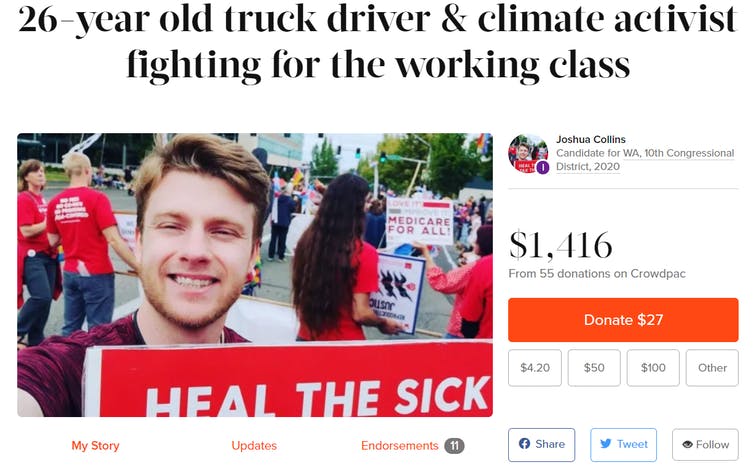The success of politicians in the U.S. largely depends on the amount of funding they receive from various sources. Although political action committees contribute considerably to elections, a recent survey showed that grassroots contributions – gifts under US$200 – are equally crucial and contribute a sizable amount. Donald Trump’s 2016 presidential campaign raised 69% of its funding from small donors.
Traditionally, volunteers went door to door to solicit donations from individuals. Today, politicians use social media to encourage their supporters to donate and eventually vote for them. Many politicians such as senators Bernie Sanders and Ted Cruz have turned to this sort of political crowdfunding.
The primary objective of political crowdfunding is to assist politicians in raising funds directly from individual donors. However, it’s also crucial for assessing the acceptance of politicians’ political agendas among potential supporters. Crowdfunding can reach and create loyalty from a much broader group than a party’s usual base, while minimizing the party’s and donors’ time and effort.
Although political crowdfunding is potentially becoming a way to build a strong sense of community, the impact of these campaigns may go far beyond that. These campaigns often focus on socially divisive partisan issues such as gun control and climate change. Discussions on these issues can influence potential supporters to develop highly polarized opinions on partisan issues.
As a computer scientist who researches social media and persuasion, I’ve studied whether casual exposure to political crowdfunding campaigns might create a long-lasting sense of disapproval on partisan issues, even when those issues are not being discussed as part of a political fundraising campaign.
My colleagues and I found that casual exposure to these campaigns can influence people’s opinions on politically sensitive issues such as climate change. These influences can stay active for many days and can influence people’s decisions on the same topic, even when it is not discussed by a politician in a political campaign.
Lasting influence of political crowdfunding campaigns
Our team recruited subjects from Amazon Mechanical Turk, an online platform for hiring people according to various criteria. We hired them in two groups: the first group supported the Democratic Party, and the other group supported the Republican Party.
We first showed all of our subjects a political crowdfunding campaign of a politician from the political party that they did not support. This process allowed us to present the argument about climate change from a particular perspective we believed the subjects would not naturally support because of their political ideology.
